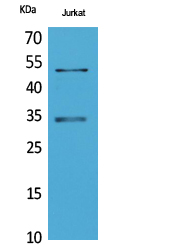
| WB | 咨询技术 | Human,Mouse,Rat,Chicken |
| IF | 咨询技术 | Human,Mouse,Rat,Chicken |
| IHC | 咨询技术 | Human,Mouse,Rat,Chicken |
| ICC | 技术咨询 | Human,Mouse,Rat,Chicken |
| FCM | 咨询技术 | Human,Mouse,Rat,Chicken |
| Elisa | 1/10000 | Human,Mouse,Rat,Chicken |
| Aliases | MYOD1; BHLHC1; MYF3; MYOD; Myoblast determination protein 1; Class C basic helix-loop-helix protein 1; bHLHc1; Myogenic factor 3; Myf-3 |
| Entrez GeneID | 4654 |
| WB Predicted band size | Calculated MW: 35 kDa; Observed MW: 35 kDa |
| Host/Isotype | Rabbit IgG |
| Antibody Type | Primary antibody |
| Storage | Store at 4°C short term. Aliquot and store at -20°C long term. Avoid freeze/thaw cycles. |
| Species Reactivity | Human,Mouse,Rat,Chicken |
| Immunogen | The antiserum was produced against synthesized peptide derived from human MyoD around the non-acetylation site of Lys99/102. AA range:61-110 |
| Formulation | Purified antibody in PBS with 0.05% sodium azide,0.5%BSA and 50% glycerol. |
+ +
1. **"MyoD1 expression in human rhabdomyosarcoma cell lines and tumours: a marker of differentiation?"**
*Authors: Dias P, Parham DM, Shapiro DN, et al.*
摘要:该研究评估了MyoD1抗体在横纹肌肉瘤中的诊断价值,发现其表达与肌源性分化程度相关,可作为辅助诊断标志物。
2. **"Immunohistochemical detection of MyoD1 in alveolar rhabdomyosarcoma"**
*Authors: Morotti RA, Nicol K, Parham DM, et al.*
摘要:通过MyoD1抗体免疫组化分析肺泡型横纹肌肉瘤,证实其特异性核表达有助于区分其他小圆细胞肿瘤,提升病理诊断准确性。
3. **"The role of MyoD1 in skeletal muscle differentiation and reprogramming"**
*Authors: Tapscott SJ, Davis RL, Thayer MJ, et al.*
摘要:探讨MyoD1抗体在体外肌肉分化研究中的应用,揭示MyoD1作为转录因子在成肌细胞定向分化中的核心调控机制。
4. **"Utility of MyoD1 and myogenin in the diagnosis of small round blue cell tumors in children"**
*Authors: Kumar S, Perlman E, Harris CA, et al.*
摘要:对比MyoD1与其他肌源性标志物(如myogenin)在儿童小圆细胞肿瘤中的表达,强调其联合检测对鉴别诊断的临床意义。
Myoblast Determination Protein 1 (MyoD1), a member of the myogenic regulatory factor (MRF) family, is a transcription factor critical for skeletal muscle differentiation and development. It acts as a master regulator by binding to specific DNA sequences to activate muscle-specific gene expression, driving myoblast commitment to the myogenic lineage. MyoD1 antibodies are widely used in research and diagnostics to detect MyoD1 protein expression, primarily through techniques like immunohistochemistry (IHC), Western blotting, or immunofluorescence.
In research, these antibodies help study muscle regeneration, developmental biology, and cellular reprogramming, as MyoD1 can induce non-muscle cells to adopt a myogenic fate. Clinically, MyoD1 antibodies serve as diagnostic markers for certain tumors. For example, MyoD1 positivity is observed in a subset of rhabdomyosarcomas and small round cell sarcomas, aiding in their classification. However, its expression is rare in other soft tissue tumors, making it a valuable differential diagnostic tool.
Commercial MyoD1 antibodies are typically monoclonal, raised against specific epitopes of the human MyoD1 protein. Variability in antibody specificity may arise due to differences in clone selection or experimental conditions, necessitating validation with appropriate controls. Cross-reactivity with other myogenic factors (e.g., Myf5. myogenin) has been reported in some cases, requiring careful interpretation. Overall, MyoD1 antibodies remain essential tools for exploring muscle biology and improving tumor diagnostics.
×